|
|
|
Sort Order |
|
|
|
Items / Page
|
|
|
|
|
|
|
| Srl | Item |
| 1 |
ID:
141298
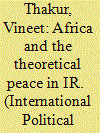

|
|
|
|
|
| Summary/Abstract |
This article responds to the debate on “The End of IR Theory?” that appeared in a recent volume of the European Journal of International Relations. It argues that the pronouncements about “theoretical peace” carry the subtext of “epistemic violence,” foreclosing the debate and the possibility of theoretic interventions emerging from the non-West—in this case, Africa. Elucidating how IR theory (IRT) has remained a parochial enterprise by the deliberate silencing of Africa, the article then finds pathways by which Africa can contribute to IRT. Using the metaphor of storytelling, it lists eight different ways in which Africa can tell new stories in IR.
|
|
|
|
|
|
|
|
|
|
|
|
|
|
|
|
| 2 |
ID:
157083
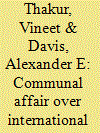

|
|
|
|
|
| Summary/Abstract |
This paper makes an archival journey into the making of institutes of international affairs in late colonial India. By exploring the intertwined lives of two such institutions, it unearths an ideational fight over the study of international affairs in India between the Indian Institute of International Affairs (IIIA), established in 1936, and the Indian Council of World Affairs (ICWA), started in 1943. From the outset, the IIIA was strongly pro-government and saw the ICWA as an institutional rival and a propaganda front for the Indian National Congress (INC). Closer to Independence, the two institutes were increasingly divided along communal and nationalist political lines. The IIIA's leadership became dominated by Muslims and the Muslim League and the ICWA by Brahman Hindus and the INC. As a result, a battle for legitimacy and recognition ensued over participation in international conferences and the ability to publish meaningful research. The ICWA successfully organised the Asian Relations Conference in March 1947, which sealed the fate of the IIIA. It moved to Pakistan in the wake of Partition, then quietly closed down after co-existing briefly with the Pakistan Institute of International Affairs (PIIA).
|
|
|
|
|
|
|
|
|
|
|
|
|
|
|
|
| 3 |
ID:
141964
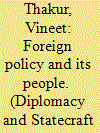

|
|
|
|
|
| Summary/Abstract |
Just as apartheid was ending, South Africa’s foreign relations witnessed a massive expansion. However, the Department of Foreign Affairs that was to manage this change found itself undergoing institutional transformations of both personnel and ideology. Studies on South African foreign policy have mostly neglected this transformation, which has had a considerable influence on the content and direction of South African foreign policy. In discussing this seldom-studied issue, this analysis unearths the discussions and debates that took place between various stakeholders to bring about transformation in the Department. In doing so, it argues that two different cultures of diplomacy came together in forming the new Department of Foreign Affairs. These cultures have had a significant impact on the thrust and direction of post-apartheid South Africa foreign policy.
|
|
|
|
|
|
|
|
|
|
|
|
|
|
|
|
| 4 |
ID:
156810
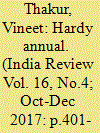

|
|
|
|
|
| Summary/Abstract |
This article traces the history of India’s first resolution at the United Nations (UN). Introduced in 1946, “Treatment of Indians in the Union of South Africa” became an annual item on the UN agenda until 1962 when it was merged with another India-sponsored item on “apartheid.” For seventeen years, in a fast polarizing world, Indian diplomats used this item to strategically galvanize global opinion against racism. Against all odds, Indian representatives utilized every diplomatic means available to keep the “hardy annual” alive. A thick, archival biography of this item also allows us to interrogate India’s diplomatic practice in the Nehru years.
|
|
|
|
|
|
|
|
|
|
|
|
|
|
|
|
| 5 |
ID:
155161
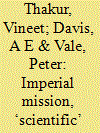

|
|
|
|
|
| Summary/Abstract |
This article offers an alternative account of the origins of academic IR to the conventional Aberystwyth-centred one. Informed by a close reading of the archive, our narrative proposes that the ideas and method of what was to become IR were first developed in South Africa. Here, we suggest how the creation of a racially-ordered state served as a template for the British Commonwealth and later the World State. We draw further on the British dominions’ tour of Lionel Curtis, founder of the Royal Institute of International Affairs (RIIA), between September 1909 and March 1911, to indicate how Edwardian anxieties about the future of empire fuelled the missionary zeal of imperial enthusiasts, who placed enormous trust in the ‘scientific method’ to create a unified empire. This method and the same ideas were to become central features of the new discipline of IR. By highlighting the transnational circulation of these ideas, we also provide an alternative to the nationally-limited revisionist accounts.
|
|
|
|
|
|
|
|
|
|
|
|
|
|
|
|
| 6 |
ID:
124988
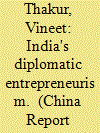

|
|
|
|
|
| Publication |
2013.
|
| Summary/Abstract |
The article documents India's involvement in the Korean crisis from 1950-1952. It argues that India's 'diplomatic entrepreneurism' allowed it to become the interlocutor, mediator and adjudicator, all rolled into one, helping India to create a space of manoeuvre for itself in the fast polarizing international system. Jawaharlal Nehru expectedly is the main protagonist in this tale, yet it also seeks to bring forth contributions of other Indian diplomats which have generally been buried under Nehru's weight, in studies on Indian foreign policy. Moreover, it responds to the call for a greater engagement with Indian diplomatic history, a field that is severely understudied.
|
|
|
|
|
|
|
|
|
|
|
|
|
|
|
|
| 7 |
ID:
183216
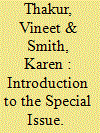

|
|
|
|
|
| Summary/Abstract |
Disciplinary histories are, by default, complicit in the production of subjective memories as truth. This Special Issue builds on the existing scholarship on rethinking IR's disciplinary history by expanding its geographical focus beyond the West, and explores how IR came to define itself as a self-contained body of knowledge that is distinct from other fields of study in different parts of the world. These alternative histories enable us to appreciate that the development of IR as a global discipline was only possible through a transnational circulation of key ideas such as sovereignty, empire, Commonwealth and, especially, competing notions of the ‘international’. In addition, they bring attention to the purpose of knowledge and the politics of its production, and allow for both democratisation as well as discursive plurality.
|
|
|
|
|
|
|
|
|
|
|
|
|
|
|
|
| 8 |
ID:
160222
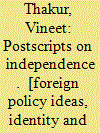

|
|
|
|
|
| Publication |
New Delhi, Oxford University Press, 2018.
|
| Description |
liii, 331p.hbk
|
| Series |
Critical Global Thought
|
| Standard Number |
9780199479641
|
|
|
|
|
|
|
|
|
|
|
|
Copies: C:1/I:0,R:0,Q:0
Circulation
| Accession# | Call# | Current Location | Status | Policy | Location |
| 059471 | 327.54/THA 059471 | Main | On Shelf | General | |
|
|
|
|
|
|
|
|
|